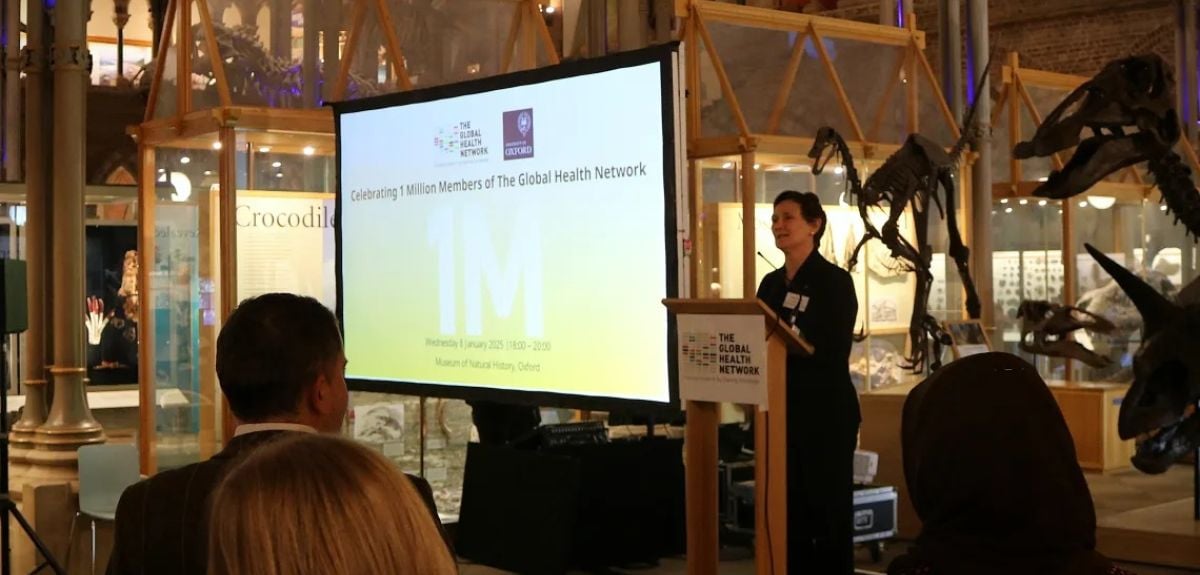
The Global Health Network reaches 1 million members
The Global Health Network has achieved a remarkable milestone: one million members worldwide. This dynamic and inclusive community of healthcare professionals and researchers is addressing two of the most pressing challenges in global health. By equipping teams to tackle everyday diseases of poverty and strengthening the ability to detect and respond to emerging threats, The Global Health Network is saving lives and safeguarding the future of global health.
Every day, millions suffer from preventable and treatable diseases that disproportionately affect underserved communities. At the same time, the threat of the next global outbreak looms large. The Global Health Network is transforming how these challenges are met by empowering all levels of healthcare workers with the skills, tools, and connections to conduct research that directly benefits their patients and communities. This is disrupting outdated hierarchies and driving equity in where research happens, who leads it and who benefits from the evidence.
The Global Health Network’s mission is to create equitable access to knowledge, resources, and training, enabling healthcare teams in every setting to undertake and lead research. This approach bridges gaps in health systems, ensuring that even the most resource-limited teams can generate high-quality evidence and deliver effective, context-specific solutions.
The Network is connecting healthcare teams across regions, disciplines, and disease areas in person and using the best digital technology to make knowledge discoverable everywhere. Its federated leadership model spans Latin America and the Caribbean, Africa, the Middle East and North Africa, and Asia, ensuring that its resources are accessible, practical, and culturally relevant.
By embedding research skills within healthcare settings, The Global Health Network is not only addressing immediate health challenges but also building the foundations for sustainable and resilient research systems within all levels health systems.
The power of The Global Health Network’s model was recently demonstrated in the Democratic Republic of Congo, where a local research team, supported by the Network, identified and raised the alarm about the new mpox 1b clade. With access to the Network’s tools, training, and global connections, this team collected vital data to address unknowns surrounding the outbreak. This swift and coordinated response exemplifies the dual role of The Global Health Network: equipping local health workers to find practical new solutions for diseases that impact them every day and so placing the skills in their hand to respond to new and immediate threats in this connected global community, thereby strengthening global research systems to prevent future outbreaks from escalating.
The Global Health Network’s impact is far-reaching, it is poised to scale and so sustaining and expanding this work invites wider partnership. With 3,000 new members joining each week, the demand for its resources continues to grow. Policymakers, organisations, and individuals can take part in this groundbreaking initiative to ensure that every healthcare team has the tools needed to address diseases of poverty and prevent the next outbreak. As The Global Health Network celebrates this milestone, it remains focussed on its mission: fostering research equity, strengthening health research systems, and creating a healthier, safer future for all.
Professor Trudie Lang, Head of The Global Health Network said: ‘The Global Health Network is empowering practitioners across roles—nurses, midwives, allied health professionals, and more—this community can transform how research is conducted, we are disrupting old hierarchies; prioritising opportunities, inclusion and locally driven solutions. Together, we are building capacity where it is needed most, addressing diseases of poverty in marginalised communities. Continued support and collaboration, including with WHO, are essential to sustaining and expanding this impactful, collaborative and community-driven model.’
Professor Richard Cornall, Head of the Nuffield Department of Medicine said: ‘The Global Health Network’s one million members reflect on an extraordinary achievement in fostering global partnerships and empowering diverse health professionals. By connecting researchers, funders and organisations like WHO, and communities worldwide, the Network drives innovation and equitable solutions for critical challenges like malaria and maternal health. Congratulations to all who made this milestone possible!’
Professor Jeremy Farrar, Chief Scientist at the World Health Organization said: ‘It’s truly an honour to see how The Global Health Network has become a global movement, led by people all around the world working in healthcare, conducting clinical and public health research, and that there are one million members by 2025. Thank you for the extraordinary work embedding research into day-to-day healthcare globally. By fostering equity, collaboration, and practical solutions, we can strengthen global health systems and address critical challenges. We’re honoured that you are all a part of the WHO family advancing Health for All.’
Dr Nisia Trinidade, Minister of Health of Brazil, said: ‘When I was Fiocruz president, I was able to sign the membership of our institution to this initiative to develop joint projects focussed on health research and education. Today, as the Minister of Health in Brazil, I salute the one million-member milestone this initiative has achieved. The Global Health Network is crucial to Brazil’s priorities, focussing on equity and the strengthening of science and scientific evidence as a basis for public health policy. Congratulations to all members!’
Find out more about The Global Health Network online: www.theglobalhealthnetwork.org
 Expert Comment: The Modern Slavery Act at 10 – what have we learnt for human rights?
Expert Comment: The Modern Slavery Act at 10 – what have we learnt for human rights?
 Oxford tops national spinout rankings in 2025 report
Oxford tops national spinout rankings in 2025 report
 Former New Zealand Prime Minister Rt. Hon. Dame Jacinda Ardern to join Blavatnik School of Government’s World Leaders Circle
Former New Zealand Prime Minister Rt. Hon. Dame Jacinda Ardern to join Blavatnik School of Government’s World Leaders Circle
 Research into chimpanzee ‘engineers’ has implications for understanding human technological evolution
Research into chimpanzee ‘engineers’ has implications for understanding human technological evolution